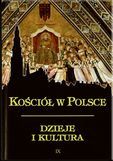PROCES UNIFIKACJI FORMACJI SEMINARYJNEJ W II RZECZYPOSPOLITEJ W ŚWIETLE "PAMIĘTNIKÓW ZWIĄZKU ZAKŁADÓW TEOLOGICZNYCH W POLSCE"
The Process of Unifying Seminary Formation in the Second People’s Republic in the Light of Memoirs of Theological Institutes in Poland
Author(s): Krzysztof KochSubject(s): History
Published by: Katolicki Uniwersytet Lubelski Jana Pawła II - Wydział Teologii
Keywords: clergy formation; Poland; memoirs
Summary/Abstract: The history of the process of forming future priest staffs is without a doubt very rich and colorful. A great step in this work was the decision of the Tridentine Council which obliged bishops to erect schools at cathedral and Metropolitan churches, which were to teach the principles of religion and form adepts in the area of church disciplines. It was these posts which were the prototypes for today’s priestly seminaries. In reality, seminaries existing in the Second People’s Republic which had just obtained freedom and had emerged from over a century of aggressive partition, so the matter of essential importance was to work out as best as possible a unified system of forming Catholic youth, particularly taking into account future ranks of clergy. In order to achieve this goal, it was perceived that organizing societies gathering educators and professors of various theological institutions existing in Poland, which through sharing their experiences, knowledge and ideas, would contribute to accomplishing this important endeavor. In this way, in 1921 the Union of Theological Institutes in Poland arose, which based its structure on the existing in France since 1905 Alliance des grands seminaires de France. Thanks to the efforts and placing the matter of clerical youth formation into the hands of members of the Union, the eight conventions which took place presented among others the arising of priestly seminaries on the formerly occupied territories: methods of work at these posts, lectured subjects and their number.Based on this data, there was an attempt to create a unified program of teaching in Polish seminaries. Though they were not able to prepare such a program, primarily on account of certain specific conditions present in the particular institutes and related with their history and tradition, even so the Union’s work should be highly estimated, since many ideas and resolutions presented at that time, despite the passing of time, can still be found today in our seminaries.
Journal: Kościół w Polsce. Dzieje i kultura
- Issue Year: 2012
- Issue No: 11
- Page Range: 129-144
- Page Count: 15
- Language: Polish

